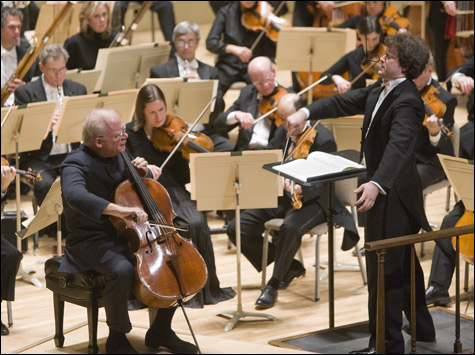
ROMANCE AT SHORT NOTICE: Rozhdestvensky’s withdrawal gave BSO assistant conductor Julian Kuerti a chance to show his stuff. |
"Maestro Gennady Rozhdestvensky is unable to conduct this performance as planned. BSO Assistant Conductor Julian Kuerti will lead this concert." Signs with this message greeted the BSO audience last Thursday, and an identically worded insert was stuffed into all the programs. What, people were asking, did "unable" mean? One rumor, confirmed two days later by Jeremy Eichler's front-page Boston Globe story, was that the 77-year-old Russian maestro, who last led the BSO four years ago, had discovered during a rehearsal break that BSO marketing was giving him smaller print on a poster than guest cello soloist Lynn Harrell, and that he had not been included on the list of "distinguished conductors" in the BSO season brochure. Mortally insulted, and ignoring apologies from the BSO, he cancelled all four of his scheduled performances. Before he returned to Moscow, he told Eichler, "I must say that I was able to conduct. And how."
So with only one rehearsal, the 31-year-old Kuerti confronted a challenging two-and-a-half-hour program of not-quite-standard 19th- and 20th-century repertoire: Edward Rubbra's fancy orchestration of Brahms's Variations and Fugue on a Theme by Handel (a Romantic's take on the Baroque), Elgar's Cello Concerto, and Tchaikovsky's ManfredSymphony, the trio surely chosen by Rozhdestvensky to show off his mastery of a variety of styles. In his absence, perhaps the half-hour Brahms could have been cut, though the still-rough performance nevertheless treated us to some sprightly wind and luscious cello solos.

A friend of mine loves the Elgar because the cello comes so close to the sound of human speech. Which is just what Harrell's understated, unrhetorical approach so beautifully captures. Confident and pointed as Kuerti's conducting was, the orchestra played with neither complete polish nor complete urgency. At the first performance, Elgar's most intimate and moving moments seemed the least focused or compelling. Kuerti seemed to be following Harrell rather than collaborating with him.
Kuerti's best work was in fact in the Russian piece. Tchaikovsky called Manfred a "symphony in four scenes after the dramatic poem by Byron," an expressionistic autobiographical verse play about a solitary and desolate wanderer overwhelmed by unexplained feelings of guilt. It's not Tchaikovsky's most popular symphony (the BSO last played it in 1997), and it has at least one embarrassing patch (the final music of "redemption," with organ, sentimentalizes Byron's despair), but it pours out its heart in passionate melody and brims with marvels of orchestral wizardry (especially the way the Scherzo's twinkling supernatural harps and flutes suggest the rainbow spray of a waterfall). By the end of the first movement, Kuerti ignited the orchestra, and what had seemed merely expert took on vibrant life.
At the Longy School, where some eight decades ago Elliott Carter studied music, the Pacifica Quartet, just baptized Musical America's Ensemble of the Year, got the Carter 100th-birthday tributes off to an early start with a riveting performance of his 1971 Pulitzer Prize-winning String Quartet No. 3. It's organized around two duos (violin/cello, violin/viola) who play in dramatically opposing modes — one expressively disregarding regular beats, one reveling in them. The first duo have four contrasting movements ("Furioso," "Leggerissimo," "Pizzicato giocoso," "Andante espressivo"), the second have six (among them "Appassionato," "Largo tranquillo," and "Scorrevole," or "scurrying"). Each pair repeat their short movements in different sequences so that by the end you've heard all the movements (and attitudes) overlapping in every possible combination, beginning in breathtaking cacophony ("Furioso" versus "Maestoso") and ending with a breathtakingly abrupt Coda. My one reservation about the Pacifica's stunning version was that Carter's slow movements didn't quite get their full, mysterious weight.
The concert opened with Beethoven's penultimate quartet, Opus 132 in A minor, the profound piece that helped inspire T.S. Eliot's Four Quartets. Everything went beautifully, yet I heard no surprises, nothing new. The evening closed with George Crumb's anti–Vietnam War Dark Angels, in which bows get drawn not only across strings but also across the sides of a tam-tam and glasses of water and the players not only play but cry out and whisper and click. In 1970, it seemed both avant-garde and sentimental; now, it has a certain amusing but tedious nostalgic charm. The Pacifica four played it as if it they'd never heard anything like it before.
Benjamin Zander planned an intricately interconnected program for his latest Boston Philharmonic concert: the familiar reconstruction of Bach's Concerto for Oboe and Violin (the lost version of what has survived only as Bach's later transcription for double keyboard), the Berg Violin Concerto (which uses a Bach chorale in its elegy for the death of Manon Gropius, the angelic 18-year-old daughter of Alma Mahler and architect Walter Gropius), and Beethoven's Eroica Symphony — a powerful contrast to the intimacy, playfulness, and spiritual sublimity of the Bach and the heartbreakingly personal Berg.